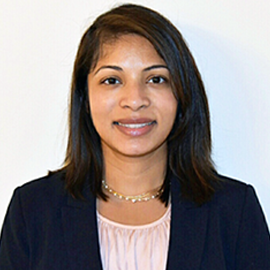Q&A with Dr. Jenny Rajan
 What inspired you to become an audiologist?
What inspired you to become an audiologist?
Growing up, I’ve always enjoyed learning about anatomy and physiology and knew I wanted to work in healthcare. This was largely due to my mother’s influence, as a dedicated Registered Nurse. I explored many career options, but it was an undergraduate professor, who inspired me to become an audiologist. The science of hearing and balance as well as the technological advancements in treatment options were appealing to me. My professor was knowledgeable and passionate about the profession and treated her patients with the utmost care. We saw the difference she made in their lives. She taught us the value an audiologist had in improving a patient’s quality of life. I am forever grateful to her and love what I do! My hope is to pass on that same inspiration to my students.
What made you decide to specialize in pediatrics?
Throughout my career I’ve always worked with children. I especially love working with preschoolers and the challenges and creativity it requires to get through a full evaluation. I also enjoy counseling families on treatment options for their child. The most rewarding part is watching my pediatric patients grow and become successful over the years. I love teaching the pediatric audiology courses and working with this population in our clinic (the Pennsylvania Ear Institute) with our students. I am proud to say that I recently obtained my Pediatric Audiology Specialty Certification (PASC) through the American Board of Audiology (ABA).
What are some of the major differences in testing/treating children vs adults?
Children are not small adults. They are continuing to grow – physically, socially and emotionally. A pediatric audiologist is interested in all aspects of a child’s development. This includes, but is not limited to, prenatal history, birth history, developmental milestones and performance in school/daycare. Family, caregivers, therapists, physicians and educators are all considered part of the “team” managing the child so he/she can reach his/her full potential. Second, pediatric audiologists have specialized equipment and training to test children from birth to 21 years of age. Through their training and experience, they are able to test the most challenging patients.Third, you have to have a desire for working with children and their families. Appointments don’t always go as expected, and it takes longer to evaluate young children. They may be anxious, timid or fatigue easily. The pediatric audiologist has to remain flexible, patient and persistent. Sometimes it may take several visits to get a full hearing evaluation completed.
What clinical interests do you have?
Hearing instrument technologies, pediatrics and counseling.
What advice do you have for the next generation of audiologists?
My first advice is to never ever stop learning. Once you graduate, life may get busy and routine, but make every effort to continue to read professional journals and magazines. Stay current on the latest developments in the audiology world. My second piece of advice is to give back to the profession. Once you have worked in the field for a few years, consider being a clinical preceptor for students. A well-trained preceptor is essential in the growth of the student clinician. You can probably think of a preceptor who molded you to where you are today. Trust me – it’s truly a rewarding experience! Good luck on a successful career!